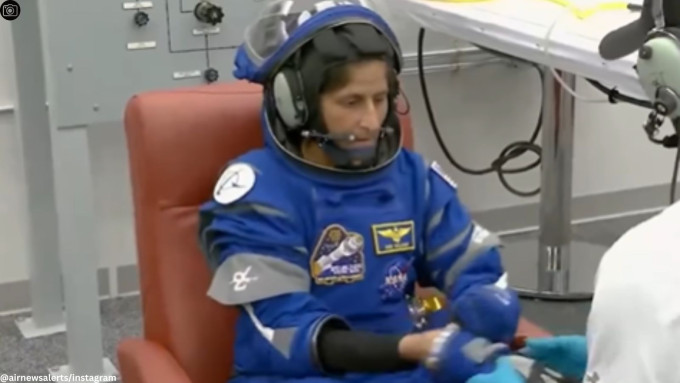Sunita Williams may face risk of potential brain damage due to extended stay in space
NASA is grappling with an unprecedented situation as the return of astronauts Sunita Williams and Butch Wilmore from the International Space Station (ISS) hangs in the balance. Originally scheduled for a brief mission aboard Boeing’s Starliner capsule, technical issues have forced the space agency to consider extending their stay in orbit until early 2025.
This unexpected development has raised concerns about the safety and well-being of the crew, and the implications for future space missions.

According to experts, the risks associated with space travel extend far beyond the weightlessness and radiation commonly discussed. A critical, yet often less emphasised, concern is the potential for brain damage caused by oxygen deprivation, said neurologist, and stroke specialist Dr Bhupesh Kumar at Medharbour Multispeciality Hospital.
Understanding the Space Environment
Space is an unforgiving environment where the absence of atmospheric pressure and the extreme vacuum conditions necessitate careful life support management. Astronauts rely on spacecraft systems to provide a controlled atmosphere, including oxygen levels necessary for human survival. Any failure in these systems can lead to serious health consequences.
Dr Shailesh Jha, Consultant Phychiatrist, Indraprastha Apollo Hospitals, explained that the unique environment of space leads to fluid shifts in the body, where fluids redistribute towards the upper body, potentially increasing intracranial pressure. This condition can result in headaches, visual impairments, and pressure on the brain, which would be a concern for long-term health.
He added that exposure to cosmic radiation in space poses a risk of DNA damage, which can increase the likelihood of developing cancer and other neurological conditions. “NASA closely monitors radiation levels, but the extended duration of Williams’ mission raises concerns about cumulative exposure and its potential effects on cognitive functions and overall brain health,” he said.
 Space is an unforgiving environment where the absence of atmospheric pressure and the extreme conditions of vacuum necessitate careful life support management (File Photo)
Space is an unforgiving environment where the absence of atmospheric pressure and the extreme conditions of vacuum necessitate careful life support management (File Photo)
The Importance of Oxygen
Oxygen is vital for brain function. The brain is highly sensitive to changes in oxygen levels, and even short periods of deprivation can have profound effects, explained Dr Kumar.
“Even a few minutes of oxygen deprival can result in the death of brain cells, which is a permanent condition, also proving fatal sometimes,” he said.
In the context of space travel, astronauts are supplied with oxygen through a life support system that is designed to ensure a constant supply. However, if this system were to fail or if there were an emergency leading to oxygen depletion, the risks would be significant.
-
Hypoxia and Its Effects:
- Immediate Impact: Hypoxia, or insufficient oxygen reaching the brain, can cause dizziness, confusion, and impaired cognitive function. In severe cases, it can lead to unconsciousness.
- Long-Term Damage: Prolonged hypoxia can result in irreversible brain damage, Dr Kumar said. The brain’s neurons are particularly vulnerable because they require a constant supply of oxygen to function and repair themselves. Chronic hypoxia could lead to cognitive deficits, memory loss, and other neurological impairments.
-
Space-Specific Concerns:
- Microgravity Complications: The effects of hypoxia in a microgravity environment might differ from those on Earth. The lack of gravity can affect blood flow and respiration, potentially exacerbating the effects of oxygen deprivation, he said
- Radiation Exposure: Space radiation can compound the risks of brain damage. While radiation doesn’t directly affect oxygen levels, its presence adds to the overall risk of neurological issues for astronauts.
What about emotional blowback?
Neurologist Dr Sudhir Kumar talked about how an unplanned stay like Sunita’s, which also doesn’t seem to be ending anytime soon, can lead to issues like Post-Traumatic Stress Disorder (PTSD).
Astronauts on unplanned extended missions face prolonged isolation from family, friends, and society. This isolation, combined with the confined living conditions of spacecraft or space stations, can lead to feelings of loneliness and emotional distress.
Not to mention, extended missions can lead to physical fatigue and health issues, which compound emotional stress. The physical strain of adapting to microgravity, maintaining health, and dealing with the constraints of the spacecraft can contribute to mental fatigue.
📣 For more lifestyle news, click here to join our WhatsApp Channel and also follow us on Instagram
Disclaimer: The copyright of this article belongs to the original author. Reposting this article is solely for the purpose of information dissemination and does not constitute any investment advice. If there is any infringement, please contact us immediately. We will make corrections or deletions as necessary. Thank you.

